Lecture
We are offered so many different ways to build up the reference mass , that the further, the more difficult it becomes to deal with all this. There are many different factors that create a common link portrait of a site or page and influence the ranking of search engines .
Below I want to share with you the results of a study that I conducted during the month. This study deals with the most important factors that are considered by Google in the reference ranking.
Here are the metrics that we will explore:
The reason why I use metrics in my research, because they allow me to take a better look at the main indicators of links. tools give an estimate of a page or site, similar to how Google does when ranking (at least I hope so).
We can safely say that Page Rank is not the only indicator that affects the ranking and rely only on it is meaningless. Fortunately, has created tools that solve this problem.
For my research, I chose 50 highly competitive keywords , such as: SEO, search engine optimization, internet marketing, credit cards, car insurance , ... and many more, then I explored pages that were based on these queries in TOP-19 search results.
I decided to use highly competitive queries for greater accuracy of the experiment, since the pages from TOP-19 (or the first two pages of Google sickle) are well optimized and are being promoted by these queries.
The first thing I did was calculate the metrics of each metric for 50 keywords on 950 pages (there were several coincidences as some pages advanced on several keywords). Then all the indicators for each of the metrics were summed up and the average for each of the positions in the CEPA was calculated from 1 to 19.
For example:
Medium Link Quality Score
etc.
Average values were calculated for all the most popular metrics: Moz Rank, Moz Trust, anchor text (coefficient), domain links, Domain Trust, Domain Rank, quantity and quality of links, link diversity (all these metrics were calculated in the toolkit).
I made a list for each metric and built sites in it from a larger indicator to a smaller one and compared the list for each metric with Google SERP for each of the requests.
Every non-coincidence position when comparing lists, I noted. And at the end, as a percentage, calculated for each indicator. As a result, I was able to figure out which of the indicators more all coincided with how Google ranked the sites and which less.
Accordingly, those who had a smaller percentage of mismatch (relative error) can be considered most important when ranking , and those where no coincidence is greater - less important.
In order not to bother you with a large amount of information, I wrote briefly about the results of my experiment, and to whom the details are interesting below I gave a description with graphs for each metric.
I hope this information will allow you to more effectively increase the link mass for your site.
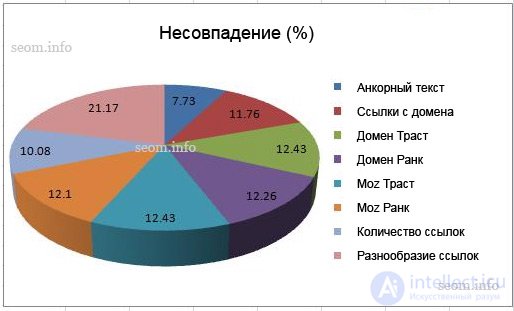
Do not worry, this chart is not the end of the article, I posted it at the beginning for the most impatient who can not finish reading.
The diagram shows the sectors of metrics and the percentage shows the relative error when comparing two lists: one of the Google SERPs, the second one that was ranked by the results of metrics indicators.
I hope that this information will be useful to you when planning link promotion. Considering the most important factors in building up the link mass and concentrating your efforts on them, you will achieve fast and most important long-term results.
In addition, my research has debunked some of the myths that have long existed among environmental managers.
Now let's explore each metric in more detail, I started with the least significant one and finish with the one that, among others, has the greatest impact on the ranking.
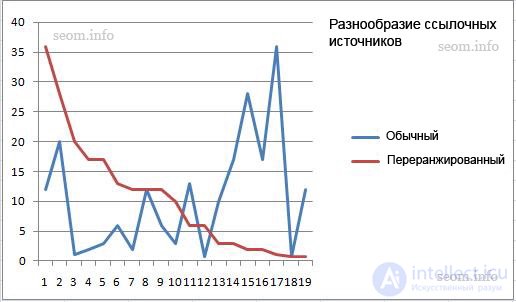
A variety of reference sources (domain variety of links) is a metric that shows the ratio of the number of domains to the number of links entering your site.
I was just shocked by the results of my research with regards to this metric, because in the past I was just sure that this was one of the most important ranking factors, as it turned out, in fact, we see a completely different picture. However, in our ranking of metrics that have the greatest impact on Google rankings, domain diversity is in last place .
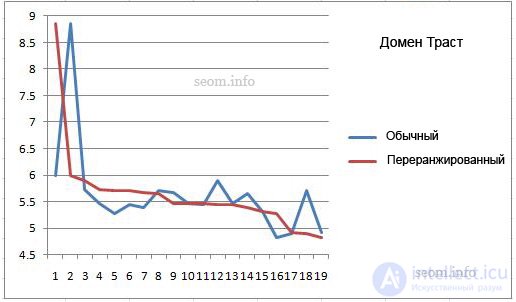
The domain of trust originated from another metric - moz Trust , which calculates how much "trust" links give to your domain.
This metric is calculated for the whole site , as we see from the results of our research, it still has some weight in the ranking, but still far from saying that it is very important. Despite this, I do not advise ignoring trust references . But now this is not the most important, is it?
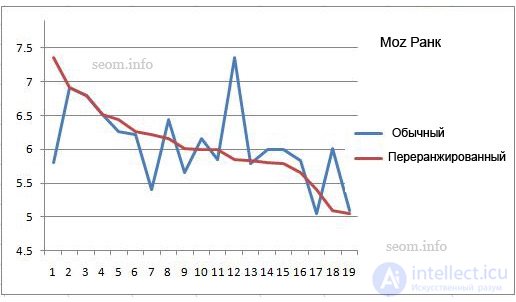
Just do not tell me that you are surprised to see this metric here. I used the Moz Rank for calculating the weight that the page receives from its entire reference mass.
Naturally, the more quality links a page has, the more link weight it gets, the more link weight it gets, the higher the search engines will rank, right?
Well ... yes, but still, according to the results of our research, this metric cannot yet be called such that it has a great influence on the ranking. Therefore, it is not enough to have just quality links, but together with other factors described below, this metric can be of great importance in the struggle for positions in the SERP.
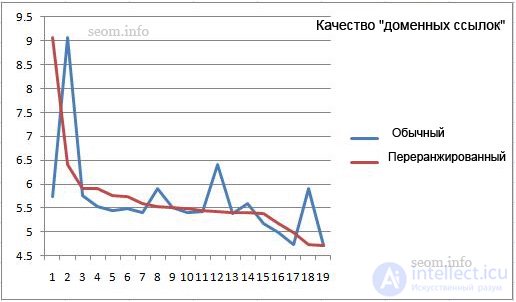
I used the Domain Rank tool to measure the quality of the links that go to the domain or to measure the reference weight that is transferred to the domain. It was interesting to know that the quality of the "domain links" plays a bigger role than the quality of the "page links".
However, it is not necessary to neglect the quality of links, this factor is far from the last place in the ranking.
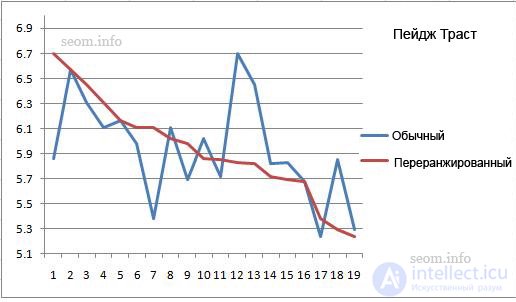
This metric is based on mozTrust , which calculates how much trust (trust level) sends links to your “page”.
According to my data, trust plays an equally important role than reference weight. This is something that should be borne in mind when selecting links. Can a domain from which you want to receive a link transfer you some trust?
The principle of trust is based on which domains link to you , from their level of trust your own level of trust is calculated.
So we are close to the three most important factors that most of all affect the ranking of search engines .
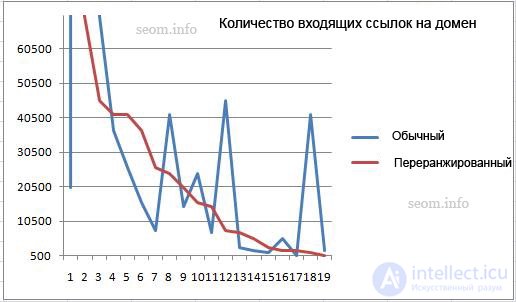
The number of inbound links to your "domain", in general, may also affect the ranking of your keywords. Therefore, the link mass should be increased not only for the page being promoted, but also for all other pages of the site. Google wants to see a popular domain, rather than a page overloaded with links.
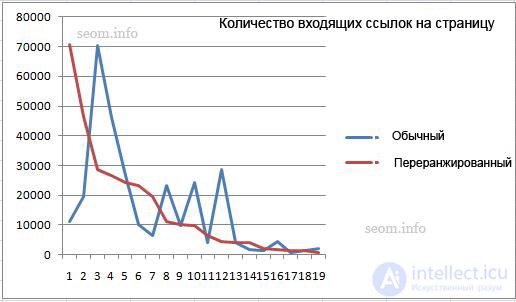
Yes, you probably guessed that you needed as many inbound links as possible. Now we can accurately say the number of incoming links is an important ranking factor . Increase the number of your links, do not stop.
So I announce the first place, drum roll, please !!!
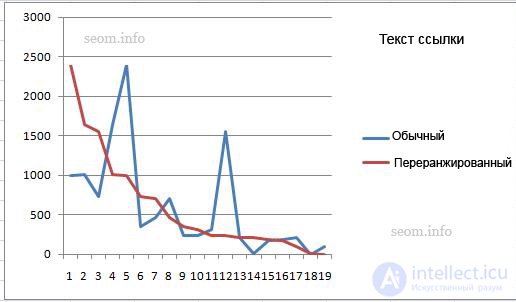
I suspected this before, but from the results of the experiment I found out for certain that the link text (the anchor text) is the strongest factor in referential ranking .
Effective use of this tool gives you the highest chance of getting good positions in the Google SERP by your keywords.
Naturally, this study is very superficial and I plan to explore this topic further in the future, I am sure that for many it will be interesting.
I am sure that the information you read in this article will help you more effectively build a strategy for referential promotion.
Disclaimer - I do not partner with Google or .org. This article is only my personal point of view which is based on my own research.
Comments
To leave a comment
seo, smo, monetization, basics of internet marketing
Terms: seo, smo, monetization, basics of internet marketing